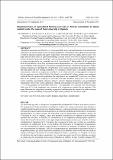Responsiveness of agricultural training curricula in African universities to labour market needs: the case of Gulu University in Uganda

View/
Publication Date
2017-03-11Author
Walter Odongo, Stephen Wamala Kalule, Enos Katya Kule, Elly Ndyomugyenyi, Duncan Ongeng
Metadata
Show full item recordAbstract/
Agricultural universities in Africa have a core responsibility to develop and implement relevant curricula to produce well trained human resource to guide stakeholders in production, value addition and marketing to meet the expected quantity and quality requirements of modern agri-food supply chain systems. This paper presents innovations in agricultural training curricula at Gulu University in Uganda designed to produce the breed of graduates, blending in character, the attitudes, hands-on practical skills and knowledge to exploit and succeed in the commonly perceived “non- attractive” labour market of the agricultural sector in Sub-Saharan Africa. Key ingredient in curricula orientation, as a critical input in modelling that type of graduate, is the integration of community engagement and agri-enterprise development in student training. Making use of the Bachelor of Agriculture (BAG) degree programme, the pioneer programme that kick-started the new training orientation, we conducted a tracer study to document employment characteristics, transition to employment and the level of satisfaction with training approach among the first five graduate cohorts (2009-2013) in 2014. Results showed that 84 % of the graduates were employed within the first six months after graduation. The employment rate surpassed 90 % after one year. About 80% of the graduates were employed in rural and semi-urban localities. Employment was in diverse sectors including government extension advisory services, financial institutions, non-governmental organisations, the private sector, agricultural research and graduate-own agro-based enterprise. Only 1.7 % of the graduates had established businesses. Most graduates were satisfied with job placement while over 90 % of the employers were contented with competencies exhibited by the graduates. This paper illustrates that integrating community engagement and enterprise development in student training contributes greatly to building competencies of agricultural graduates for the labour market.
